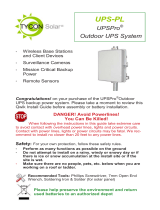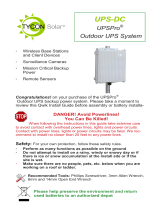Page is loading ...

UPS-120 Series
UPSPro®
Outdoor UPS System
▫ Wireless Base Stations
and Client Devices
▫ Surveillance Cameras
▫ Mission Critical Backup
Power
▫ Remote Sensors
Congratulations! on your purchase of the UPSPro®Outdoor
UPS backup power system. Please take a moment to review this
Qwik Install Guide before assembly or battery installation.
DANGER! Avoid Powerlines!
You Can Be Killed!
When following the instructions in this guide take extreme care
to avoid contact with overhead power lines, lights and power circuits.
Contact with power lines, lights or power circuits may be fatal. We rec-
ommend to install no closer than 20 feet to any power lines.
Safety: For your own protection, follow these safety rules.
▫ Perform as many functions as possible on the ground
▫ Do not attempt to install on a rainy, windy or snowy day or if
there is ice or snow accumulation at the install site or if the
site is wet.
▫ Make sure there are no people, pets, etc. below when you are
working on a roof or ladder.
Recommended Tools: Phillips Screwdriver, Flat Blade Screw-
driver, 13mm and 10mm Wrench, 5/16” nut driver,
Please help preserve the environment and return
used batteries to an authorized depot

2
Qwik Install
Note: We strongly recom-
mend installing the batteries
and other equipment in the
enclosure after mounting the
enclosure to the pole or wall.
STEP 1: Attach top and bot-
tom brackets to the enclosure.
STEP 2: Mount the enclosure
to a pole using U-Bolts and/or
4 hose clamps. The enclosure
can also be wall mounted us-
ing appropriate lag bolts
(supplied by customer).
STEP 3: Attach the included
DIN Rail to the door using
hardware provided.
STEP 4: Install 4 cable feed-
throughs to the bottom of the
enclosure.
Note: There are multiple cable gland feedthrough in the bottom of the
enclosure. If you are not using any of the feedthrough you can cut a
short piece of wire, put it through the cable gland and tighten the cable
gland on the wire to seal it.
STEP 5: Remove the fuse from the battery cable(s) and connect
wires to the batteries, then install the batteries.
STEP 6: Install the PWM Solar Con-
troller by attaching the green DIN Rail
clips to the controller using screws
provided. The extra parts aren’t used.
The controller can be mounted to the
DIN rail on the door or one of the weld-
ed DIN Rails inside the enclosure.
Connect the battery wires and the
wires from the PowerVent™ fan to the
controller battery input. Be sure to ob-
serve proper polarity. (RED=+).
CAUTION: Reverse polarity connec-
tions will damage the equipment.
STEP 7: Install the battery charger in the extra space inside the enclo-
sure. It can sit on top of the batteries, next to the batteries or in front of
the batteries. Connect the output wires from the charger to the control-
ler PV inputs. Be sure to observe proper polarity (RED = +).

3
STEP 8: Connect your load to the load output of the controller.
STEP 9: Double check wiring , then replace the fuse in the battery ca-
bles. The controller should power up and you should see parameters
displayed on the display. The controller display shows battery voltage,
charging current, load current and temperature. The load output should
turn on automatically if the battery voltage is within the allowable range;
you can also control the load output using the Load On/Off button.
STEP 10: Connect the charger power supply to a 120/240VAC source.
Just cut off the connector, strip wires and use wire nuts to wire directly
or plug into an existing outlet. When the charger is connected to an AC
source you should see charging current to the battery on the controller
display.
STEP 11: Make sure lid gasket is clean and free from any particles,
then close the cover, making sure that wires are clear of the gasket and
hinge area.
STEP 12: The UPSPro® is Solar Ready™ so a solar panel can be add-
ed at any time to provide supplemental or full time power. Solar panel
will be connected to PV input (Solar Panel Symbol) in parallel with AC
charger Power supply. Solar panels must have blocking diodes which is
the standard for most solar panels.
TECH CORNER
1.CONTROLLER: The controller turns off power to the load at 11V
(22V if 24V array) and reconnects when the battery reaches 12.5V (25V
if 24V array). This protects battery from over-discharge and increases
battery life and performance.
2. CAPACITY: With a typical AP running 4W average. A single 12V
52Ah battery should be able to provide backup power for up to 75 hours
at room temperature. For cold temperatures the capacity is reduced by
20-30%.
3. VENTING: The enclosure is vented thru the included PowerVent™.
The fan is thermostatically controlled to turn on when the temperature
inside the enclosure exceeds 45C. It runs on 12V to 24VDC.
4. DUAL INPUTS: The UPS-120 can be used with AC Power alone or
Solar Power alone or a combination of both.
5. SOLAR PANEL: The controller used in the UPS-120 can handle a
maximum panel size of 240W. Do not exceed 20A into the PV input of
the solar controller.
6. BATTERY HOOKUP: Always connect the battery first and discon-
nect the battery last. The controller should not be run without a battery
connected.

4
UPS 1 Battery System
UPS 2 Battery System

5
7. BATTERY MAINTENANCE: The batteries used in the UPSPro® sys-
tems don’t require any maintenance. They should last up to 5 years in
normal use. Note: Never store batteries for any length of time in a
discharged state or it will kill the battery, especially during cold
weather.
8. BATTERY OVERDISCHARGE: We highly recommend hooking all
equipment loads to the controller load output. This output will discon-
nect the load if the battery voltage is too low and this will protect the
battery from over-discharge. If batteries get completely discharged be-
cause the equipment was connected directly to the battery, you will re-
duce the battery life.
9. LOAD OUTPUT: The LOAD output on the Solar Charge Controller is
unregulated. What that means is the voltage output follows the battery
voltage. This is typically 11-15V for a 12V system and 22-29V for a 24V
system. It is up to the user to make sure the connected load is compati-
ble with these voltages. A voltage regulator can be added to provide
regulated output voltages. Tycon® offers a full range of DCDC convert-
ers and PoE Injectors with regulated outputs.

6

7
SPECIFICATIONS Subject to change without notice
Battery Voltage (DC) 12V / 24V
Load Output Voltage (DC) 11-15VDC / 22-29VDC
Suggested Max Load 100W
AC Input Voltage 120/240VAC 50/60Hz 2.5A Max
Battery Charge Voltage 14.4V / 28.8V
Battery Charge Current 8.3A / 4.35A
Battery Charge Capacity 120W
Battery Capacity 52Ah to 104Ah
Battery Type Valve Regulated Sealed Lead
Acid / Absorbent Glass Mat (AGM)
Battery Life 5 Years
Controller Type 20A PWM with status display and
load control
Overcharge Protection 14.4V / 28.6V
Over-discharge protection 11V / 22V
Over-discharge recovery voltage 12.5V / 25V
Controller Self Consumption <0.3W
Enclosure Type Powder Coated Aluminum
Enclosure Size 12 x 14 x 15"
(305 x 356 x 381mm)
Operating Temperature -40°C to +65°C
(-40°F to 149°F)
System Weight (without batteries) 20lbs (9kg)
Battery Weight (each) 40lbs (18kg)

8
8000099 Rev 1 UPS-120 UPSPro® Qwik Install Guide
Limited Warranty
The UPSPro® products are supplied with a limited 36 month warranty
which covers material and workmanship defects. This warranty does
not cover the following:
▫ Parts requiring replacement due to improper installation, misuse, poor site
conditions, faulty power, etc.
▫ Lightning or weather damage.
▫ Physical damage to the external & internal parts.
▫ Products that have been opened, altered, or defaced.
▫ Water damage for units that were not mounted according to user manual.
▫ Usage other than in accordance with instructions and the normal intended
use.
NOTES
/










